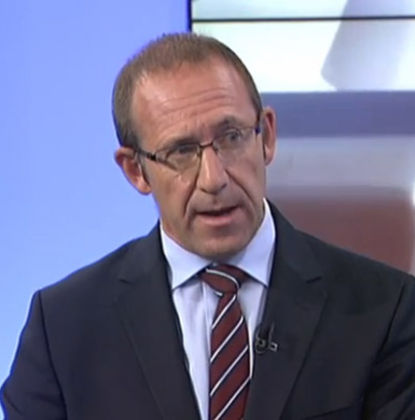Labour leader Andrew Little says he stands by his threats to ‘stiff-arm’ the banks into passing OCR cuts on to customers.

“I stand by the stance I took, which is to get very heavy-handed with the banks,” Mr Little told TV One’s Q+A programme.
“Because the truth is when the banks fail to follow the signal that the Reserve Bank is sending, that’s keeping money out of the back pockets of ordinary Kiwis, and I will always fight for their interests and for their rights,” he said.
“If the banks don’t want to play ball when it comes to the way we run our monetary policy, actually, there’s only one outfit that can really take them on, and that’s the government.”
On March 10, the Reserve Bank cut its official cash rate 25 basis points to 2.25%. In response, ANZ, New Zealand’s largest bank, lowered its floating rate and flexible home loan rate by 10 basis points to 5.64% and 5.75% respectively.
Other major banks took a similar line, leading Mr Little to say that if Labour was in power he would consider legislation to force banks to pass on an OCR cut in full.
NBR economics editor Rob Hosking critcised the Labour leader’s proposal, noting, “Banks have their own competitive pressures. They face their own cost pressures, and of course they still source rather a large proportion of their funding on the offshore wholesale markets, where interest rates are considerably outside the reach of the Reserve Bank.”
Mr Hosking added, “And this cuts both ways: When the Reserve Bank hiked the official cash rate in 2014, retail interest rates did not rise in a direct correlation to those hikes. Again, competitive pressures were a big part of this.
Massey University Professor David Tripe said Mr Little has a “lack of understanding of how banks and the system works.”
And even the Greens distanced themselves from the Labour leader, with finance spokeswoman Julie-Anne Genter saying the party would prefer a “more consultative approach.”
On Q+A, the Labour leader wouldn’t be drawn on whether his position was pre-planned policy or off-the-cuff.
But he did say that he sticks beside his March comments today, and he added, “I think what some people might be having difficulty coming to grips with is that I believe that a government is there to govern, that when the interests of ordinary New Zealanders are put at risk because, in this case, a bunch of corporates decided they just don’t care about it and they want to maximise their profit, actually, the role of government is to govern and make sure things are happening in the best interest of New Zealanders. And I don’t shrink from that at all, and somebody’s got to be the voice for that, and I’m happy to be it.”
Flipping the bird
Mr Little added, “You’ve raised the issue about stiff-arming the banks. Actually, I got a huge amount of feedback from that. People are saying, ‘At last, someone’s prepared to stand up to the overseas-owned banks who, frankly, have been flipping the bird to our Reserve Bank.’
“The Reserve Bank does the orthodox thing and says, “Okay, economy’s slowing. We need to tick down interest rates so it’s cheaper to borrow, put a bit more money in people’s pockets.” And what do our overseas-owned trading banks do? They say, ‘Uh-uh. Not us. We’re not going to do that.’ That’s not acceptable. It’s actually not orthodox, but it’s also not acceptable. And what a government doing its job has to do when faced with that is stand up to them and say, ‘No, no, we’ve got an economy here that we’ve got to sort out. We’re all in this together, and we need you to be doing your bit.”
Stands by UBI
Mr Little stood by party’s universal basic income discussion paper, but also stressed it was not yet Labour policy.
“This is an idea that at least three other countries are now actively considering. So it’s an idea; it’s out there. Of course we have to look at it and have a public debate about it. it’s not Labour Party policy; we’re not going to be campaigning on it. But we’ve got to have a talk about the underlying issue that it’s seeking to address,” he said.
The concept of a UBI of around $200 a week has been supported by The Economist and Gareth Morgan, but drawn fire from the likes of The Taxpayers’ Union and Matthew Hooton, who say savings from reducing welfare bureaucracy would not be nearly enough to cover the cost of a universal basic income.
